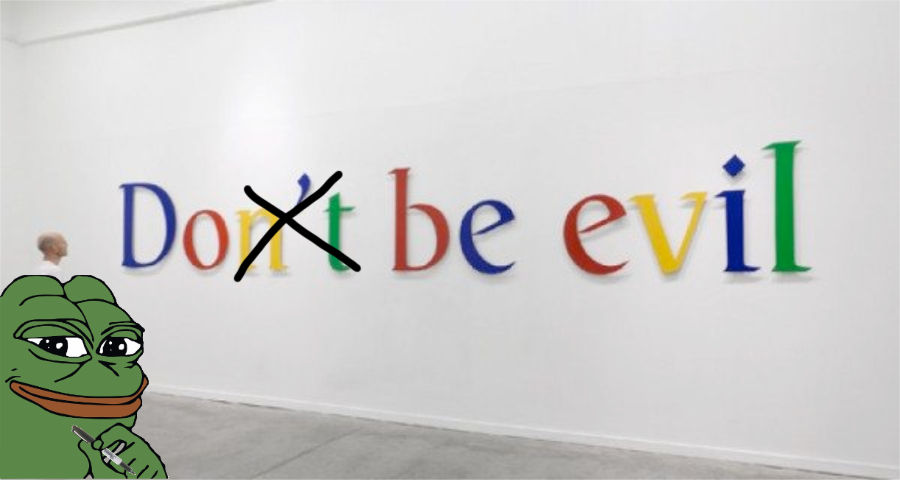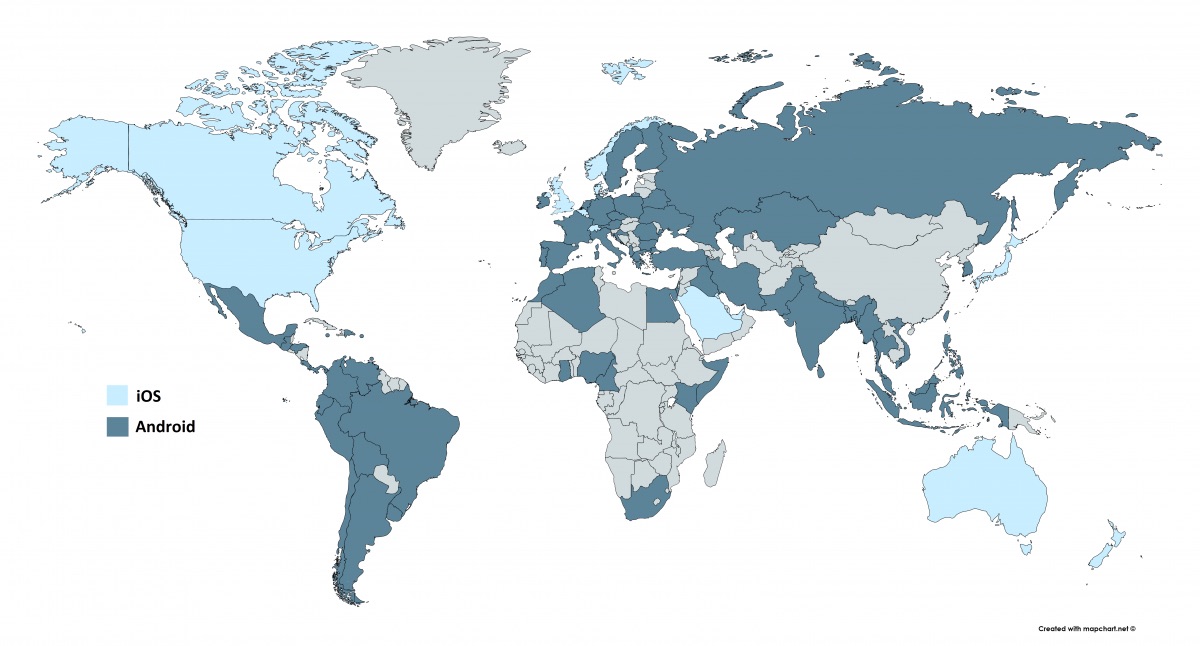Do not trust Google
Posted by Luke on the
Filed under technology, censorship
I realise that this is one of the most well-explored topics on the privacy-conscious edges of the internet, but seriously... Do not trust Google. Facebook seems to be our current punching bag of choice because of their supposed ability to manipulate political opinion, but in my opinion Google is a much more insidious company with far greater potential for abuse. Google is the largest advertising platform by a significant margin (accounting for 36.3% of advertising in the U.S. with Facebook trailing at 19.3%). At the end of the day, if you delete your Facebook account, what are you really missing out on?
Google (or more specifically Alphabet Inc.) owns the largest search engine (Google.com), the largest video streaming platform (Youtube), and the most-used smartphone operating system (Android). You might ask, "What's wrong with that? Sounds like they're just very successful at what they do". Well, let's break down those three markets (Search, Streaming, Mobile).
Search
Google's estimated market share for search traffic globally is 92.16% source. As people increasingly are using search to navigate the web (as opposed to typing a URL into the address bar), this traffic increases, those people see more ads, Google makes more money. Google then uses this money to purchase exclusivity agreements with the likes of Apple (just two years ago it was announce that Google would be paying $12 billion US to Apple to remain the default search engine on Safari in 2019 source at a cost of roughly $10 per user).
How does Google abuse Search?
If you ask the average user how Google search works, they'd probably say "it just searches for your search term across the web", but what they probably don't know is that is just the tip of the iceberg. Other dimensions of search include:
- what kind of users go to that websites (and does the user searching fit that profile)?
- how much traffic does the website get?
- how relevant the content is to the search term (SEO magic)?
- and, most importantly, does this website fit an acceptable narrative?
There's certainly an argument to be made for suppressing some search results, such as pro-authoritarian sites (e.g. communist or fascist), extremely fringe conspiracy, illegal pornography, or bomb-making instructions. Advertisers probably don't want their ads next to those results. Rightly or wrongly, Google is already suppressing content from such websites (though, they're probably still indexing them).
If Google can suppress fascist content from sites like Stormfront (prominent white-supremacy forum), then who is to say which content they can or cannot suppress? Breitbart is a well-known right wing news site that has had their content almost entirely purged from Google search results (as evidenced by the "search engine visibility" chart below).
You don't have to agree with them politically to see that Google is applying different standards to conservative content than to more liberal content. I don't visit Breitbart, I don't read their articles, and frankly I don't give a shit what they have to say, but I believe in a free and open internet. If you believe in a free and open internet then you have to agree this is wrong. During the cold war, anyone who didn't follow the extreme protectionist beliefs of the time were shouted down as communists (Even Martin Luther King Jr. was dismissed as a communist by J. Edgar Hoover). This same thing is happening now, but the buzz word is different. The new weaponised word is "Nazi". If time had elapsed differently, I have no doubt that it would be left-wing websites suppressed in search results, and that still wouldn't be okay.
There's plenty of evidence to suggest that Google is manually making these decisions to block conservative websites, however, Alphabet CEO Sundar Pichai denied that they manually censor websites at the recent Congressional antitrust hearing except for in cases where there are legal requirements or copyright issues. I don't buy that, personally.
Streaming
When YouTube was founded it was facing severe scaling problems (because video processing and streaming is extremely expensive). Fortunately for them, Google saw potential in the platform and purchased the company for $1.65bn in Google stock, and their money issues were over. Google was throwing money into scaling the platform, and it was experiencing great growth. This success turned out to be a major problem for the YouTube, because, from the time it was purchased it has been making a loss. In recent years, YouTube has become profitable, however, without the bottomless pockets of Google behind it, they never would have been able to accomplish this. What incentive could Google have to take losses year after year on YouTube? Well, it turns out user data is particularly delicious. Mastercard's CEO has infamously said "data is the new oil". I personally can't wait for Facebook, Amazon, and Google to become para-military organisations in the up-coming data wars.
YouTube has essentially bullied their way into market dominance using Google's bottomless pit of money. This is problematic because it allows failing companies to cheat death. Just like a bottom-feeding fish,latching onto a whale shark and hitching a ride. As I mentioned before, video streaming is extremely expensive, so it makes sense that great cloud infrastructure is a prerequisite to success. Well, big surprise, Google offers world-class commercial cloud infrastructure with Google Cloud Platform (GCP)! Do you suppose YouTube is paying full price for their infra?
So, when you see a headline that says "Stop paying for iCloud – Google One will now back up your iPhone for free". Before obeying the shill who wrote it, you should ask yourself, "How can a company afford to give away so much storage space for free?". Well, they can't. Google simply obscures their losses with the immense revenue from Google Ads in the profit/loss statement at the end of each quarter. For more reading about this topic, Tim Bray has a fantastic article called "Break up Google".
Mobile
This article is already becoming too long, so I'm just going to cover mobile quickly. As Tim Bray mentions in the article above, Android isn't really a business. The only real non-ad revenue they have is from the commission they get from app purchases and licensing fees from OEMs (e.g. Samsung, Huawei, LG). How, then, are they able to sustain hundreds of highly paid engineers and all the other non-technical staff required to support the system?
Above is a map of Android vs iOS market shares. You can see that iOS pretty much only has the dominant market share in first world countries (like USA, Canada, Australia, UK, Japan). Most of the emerging countries in the world are strongly in favour of Android because, unlike Apple, the OS is not restricted to a particular device. So, countries like India (where the number of smart-phone users has increased sharply from 199 million in 2015 to 401 million in 2020 source) that mostly purchase low-cost phones (e.g. Huawei, Xiaomi, Oppo). Emerging markets are extremely important to companies like Google partly because these countries are easier to exploit because they don't have strong legislation to protect users from predatory advertising, anticompetitive tactics, or data privacy. This is why I speculate that Mastercard is scrambling to connect refugees to the global payment network (Remember that quote from the Mastercard CEO: "Data is the new oil") and, indeed, why Mastercard forced Patreon to ban Robert Spencer for his anti-refugee sentiment.
Again, regardless of whether you agree with someone's political leaning or rhetoric, I shouldn't have to explain why it's ludicrous for people to believe that faceless, soulless corporations such as MasterCard or Google give two fucks about moral righteousness when their only servant is a number ticker on the Nasdaq website.
Closing thoughts
So, after reading all of that, I have to ask:
Why don't you route all of your web traffic through Google Servers?
To be clear, I'm not accusing Google of storing DNS logs or associating that with specific users (they claim that they don't in their terms of service), however, I think it's unreasonable to think that they wouldn't be capable of that. I also wouldn't put it past them to lie in terms of service considering their recent run-ins with the law ($1.7bn fine for anti-competitive behaviour, $170m for violating children's privacy on YouTube, 50 million euro fine for GDPR violations).
$2bn doesn't matter to Google. It's a drop in the bucket, especially considering they would probably be able to freely harvest user data for months or even years before they're caught and slapped on the wrist. If a single user's search data is worth upwards of $10 a year (see the Safari Google default search engine deal) for Google, then the complete logs of their browsing history would be quite juicy indeed.
Okay, so that's verging on conspiracy theory I suppose. Maybe Google DNS will remain clean. How about you get a Google® Nest™ WiFi mesh router and let them inspect all of your web traffic that way?
Or perhaps you want to buy the new Pixel and give them advanced analytics about how you use your phone (privacy class action lawsuit), everywhere you go (Location History), how much physical activity you do (Google Fit), every article/video you engage with (Chrome), everything you buy (Google Pay - and incidentally, how much disposable income you have, so they can better target more relevant ads to you). All of these "services" are simply a ruse so that Google can build an extremely accurate profile about the type of consumer you are and target you with more advertising to turn you into a soulless consumer.
I don't want these people to also be the arbiters of what content I should or should not be able to see online.
Actual closing thoughts
Well that was pretty depressing. So, how can you reclaim a shred of your privacy?
Search
There's a swathe of privacy-focused alternatives popping up these days. I personally use duckduckgo.com which is built on the Bing search API and does not track any user data. I'll concede that Duckduckgo doesn't have as good search results, but I'm okay with that. Another one is https://www.startpage.com/ which actually uses Google results, but ensures Google can't track your activity.
Streaming
I'm currently using invidio.us which, like Startpage, is just a wrapper for YouTube. So you can get the same content minus the tracking. Bonus, check out Invidition on the mozilla extension store to open all youtube links in invidio.us instead.
Mobile
I really don't have an answer for this one. I'm an iPhone user, but really, Apple is not much better, especially if you care about having a repairable device. If you really want to go hardcore there's some custom Android forks like https://grapheneos.org/
Browsing
I didn't really touch on Chrome, but I'm not happy with Chrome either. Since Edge has switched to using Chromium the only real competitor (i.e. non-Chromium) in the browser market share is Safari. I use Firefox because I believe in Mozilla and their commitment to maintaining privacy. They're doing good stuff lately.






